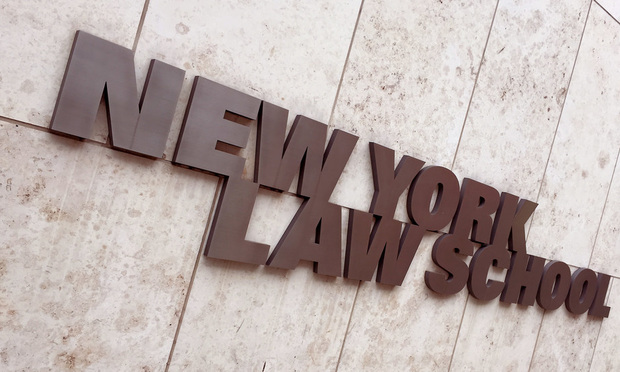New York Law School Still Faces Financial Challenges, Moody's Finds
The bond credit rating company has once again bestowed a negative financial outlook on the Manhattan school, citing its need to dip into reserve funds to cover operating expenses and soft enrollments. The school said its endowment and real estate holdings remain strong.
February 08, 2019 at 01:14 PM
3 minute read
 Photo: Carmen Natale
Photo: Carmen Natale
A national uptick in law school applicants wasn't enough to prompt a key bond credit rating agency to reverse its negative outlook on New York Law School's finances.
Moody's Investors Service on Thursday affirmed the school's Baa3 bond rating, which is the lowest rating for investment grade bonds and indicates that Moody's believes the school's bonds represent a moderate risk to investors. The Moody's report assigned the law school a negative outlook, saying that the school's spending of its financial reserves to cover operating shortfalls is “well above” the industry standard of 5 percent. The school's bonds are valued at about $140 million.
“The rating also considers tuition pricing challenges and operating deficits that will continue for the foreseeable future, leading to a likely deterioration of spendable cash and investments,” reads the Moody's report. “Despite an increase in the number of applications for law schools nationally, net tuition revenue remains pressured, resulting in a weak average operating deficit of 26 percent over the last three years.”
Law school spokeswoman Elizabeth Thomas said in a written statement Friday that the Moody's rating reflects the schools “strong leadership team, focus on strategic planning, and recent successes amid a challenging environment for legal education.”
“The rating also recognizes the high value of the school's Tribeca campus and its large endowment,” she wrote.
Amid the bad news, Moody's also found some bright spots at New York Law School. The school owns prime real estate in New York's trendy Tribeca neighborhood—three buildings that were appraised at $253 million in 2015. A profit-sharing deal tied to the sale of condominiums on land that the law school once owned helped the law school improve its fiscal picture in 2018, Moody's noted. Moreover, strategic planning that reduced operating expenses and increased enrollment helped to reduce operating deficits. Still, covering the school's operating expenses will “require extraordinary endowment spending,” Moody's found.
The school enrolled the equivalent of 960 full-time students in 2018, and generated $48 million in revenue last year, according to Moody's.
The school took out bonds to fund the construction of its main building, which opened in 2009 and cost $190 million.
New York Law School's financial picture would improve with a growth in net tuition revenue and strategic initiatives that bring its operating expenses into equilibrium, Moody's noted. But if the school has to dip too far into its reserves or the market value of its real estate declines, then its bond rating could be downgraded, the report warns.
This content has been archived. It is available through our partners, LexisNexis® and Bloomberg Law.
To view this content, please continue to their sites.
Not a Lexis Subscriber?
Subscribe Now
Not a Bloomberg Law Subscriber?
Subscribe Now
NOT FOR REPRINT
© 2025 ALM Global, LLC, All Rights Reserved. Request academic re-use from www.copyright.com. All other uses, submit a request to [email protected]. For more information visit Asset & Logo Licensing.
You Might Like
View All

Family Law Practitioners Weigh In on Court System's New Joint Divorce Program

Former NY City Hall Official Tied to Adams Corruption Probe to Plead Guilty

New Charges Expected in Sex Trafficking Case Against Broker Brothers
Trending Stories
- 1ACC CLO Survey Waves Warning Flags for Boards
- 2States Accuse Trump of Thwarting Court's Funding Restoration Order
- 3Microsoft Becomes Latest Tech Company to Face Claims of Stealing Marketing Commissions From Influencers
- 4Coral Gables Attorney Busted for Stalking Lawyer
- 5Trump's DOJ Delays Releasing Jan. 6 FBI Agents List Under Consent Order
Who Got The Work
J. Brugh Lower of Gibbons has entered an appearance for industrial equipment supplier Devco Corporation in a pending trademark infringement lawsuit. The suit, accusing the defendant of selling knock-off Graco products, was filed Dec. 18 in New Jersey District Court by Rivkin Radler on behalf of Graco Inc. and Graco Minnesota. The case, assigned to U.S. District Judge Zahid N. Quraishi, is 3:24-cv-11294, Graco Inc. et al v. Devco Corporation.
Who Got The Work
Rebecca Maller-Stein and Kent A. Yalowitz of Arnold & Porter Kaye Scholer have entered their appearances for Hanaco Venture Capital and its executives, Lior Prosor and David Frankel, in a pending securities lawsuit. The action, filed on Dec. 24 in New York Southern District Court by Zell, Aron & Co. on behalf of Goldeneye Advisors, accuses the defendants of negligently and fraudulently managing the plaintiff's $1 million investment. The case, assigned to U.S. District Judge Vernon S. Broderick, is 1:24-cv-09918, Goldeneye Advisors, LLC v. Hanaco Venture Capital, Ltd. et al.
Who Got The Work
Attorneys from A&O Shearman has stepped in as defense counsel for Toronto-Dominion Bank and other defendants in a pending securities class action. The suit, filed Dec. 11 in New York Southern District Court by Bleichmar Fonti & Auld, accuses the defendants of concealing the bank's 'pervasive' deficiencies in regards to its compliance with the Bank Secrecy Act and the quality of its anti-money laundering controls. The case, assigned to U.S. District Judge Arun Subramanian, is 1:24-cv-09445, Gonzalez v. The Toronto-Dominion Bank et al.
Who Got The Work
Crown Castle International, a Pennsylvania company providing shared communications infrastructure, has turned to Luke D. Wolf of Gordon Rees Scully Mansukhani to fend off a pending breach-of-contract lawsuit. The court action, filed Nov. 25 in Michigan Eastern District Court by Hooper Hathaway PC on behalf of The Town Residences LLC, accuses Crown Castle of failing to transfer approximately $30,000 in utility payments from T-Mobile in breach of a roof-top lease and assignment agreement. The case, assigned to U.S. District Judge Susan K. Declercq, is 2:24-cv-13131, The Town Residences LLC v. T-Mobile US, Inc. et al.
Who Got The Work
Wilfred P. Coronato and Daniel M. Schwartz of McCarter & English have stepped in as defense counsel to Electrolux Home Products Inc. in a pending product liability lawsuit. The court action, filed Nov. 26 in New York Eastern District Court by Poulos Lopiccolo PC and Nagel Rice LLP on behalf of David Stern, alleges that the defendant's refrigerators’ drawers and shelving repeatedly break and fall apart within months after purchase. The case, assigned to U.S. District Judge Joan M. Azrack, is 2:24-cv-08204, Stern v. Electrolux Home Products, Inc.
Featured Firms
Law Offices of Gary Martin Hays & Associates, P.C.
(470) 294-1674
Law Offices of Mark E. Salomone
(857) 444-6468
Smith & Hassler
(713) 739-1250






